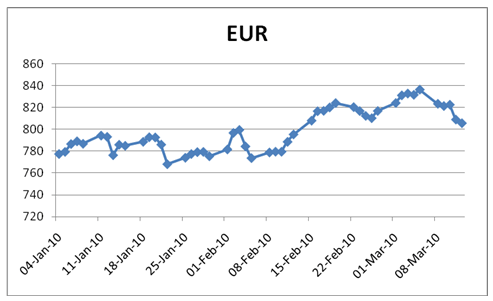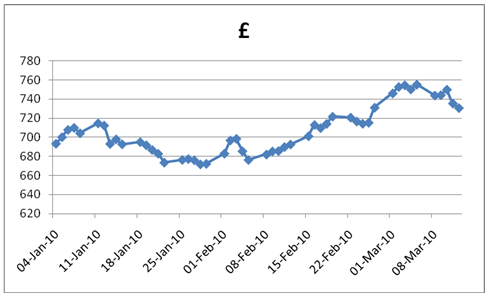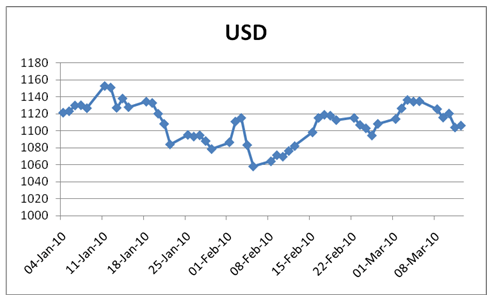The Currency Markets and the Gold Price
Commodities / Gold and Silver 2010 Mar 16, 2010 - 12:37 AM GMTBy: Miles_Banner
 Dear Reader, Over the past few months there has been a growing amount of interest in the currency markets especially the pound, the euro and the dollar. Each has faced issues that have exposed weaknesses. The pound has long come into criticism for being overvalued. The euro has been dragged through fresh scepticism by the Greek crisis, and the dollar continues to be questioned as the reserve currency of choice.
Dear Reader, Over the past few months there has been a growing amount of interest in the currency markets especially the pound, the euro and the dollar. Each has faced issues that have exposed weaknesses. The pound has long come into criticism for being overvalued. The euro has been dragged through fresh scepticism by the Greek crisis, and the dollar continues to be questioned as the reserve currency of choice.
The three charts below plot the course of the gold price in 2010, measured in terms of the three aforementioned currencies (taken from the PM gold fix).



[We update these each week on our gold price chart page.]
What’s obvious when you place the three charts together is how the three currencies follow the same general pattern, albeit with different acuteness. The announcement of fiscal measures by Greece can be seen across all of the charts at the beginning of February. This is where we see a sudden depreciation of gold [see our article The Dollar Rally Threatens to Upset the Gold Price]. To date this depreciation has been retraced over the pursuing weeks, but it highlights the contagious affect of currencies and the need to keep a close eye on international markets.
At the moment there are no clear signs for us to follow. No trend that looks certain. The markets, as they have been for the past few months are being driven by fear… led by news. We are now one year on from the bear market low of 2009 and the FTSE is up 60 percent, the S&P 500 up 70 percent. What’s more the VIX index shows bullish sentiment.
The VIX index (AKA the ‘fear gauge’) measures the anticipated volatility of the S&P 500. When the index is high it signifies a high probability of volatility. At the moment it is trading at the bottom of its two year range. This tells us that fear is leaving the market – and that risk aversion is eroding. But what about the fundamentals?
“In February alone, the US government ran a record deficit of $221 billion. And February is a short month. Annualize that and you’ve got about $2.5 trillion in excess spending.” Notes Bill Bonner at The Daily Reckoning
Here, in England, we also see a constant stream of bad news…
- The pound has fallen 28 percent so far this year and figures recently showed industrial production fell unexpectedly by 0.4 percent in January.
- Iain Campbell points out in BreakingViews, house prices will have to fall by another 17 percent to reach the historically normal ratio with average earnings.
- And even more worrying is the widening trade deficit. In January the deficit in goods and services reached £3.8bn – the highest monthly total since August 08.
A devalued pound is supposed to galvanise manufacturing and production in Britain, and it still may. But these things take time to work their way through. At a time like this demand for British products is not obvious. There are many obstacles on the path to recovery for the euro zone members, which were the recipients of nearly 55 percent of uk exports in 2009. The US is yet to start consuming at the same levels they use to and the emerging markets have no reason to look as far as Britain for their products.
As the world’s major currencies still look unsupported and the fundamentals for gold are still in place, physical gold remains the currency of choice for many central banks.
China reveals it will not partake in the IMF bullion sale
Whilst gold is still an attractive form of currency to central banks, China has taken the move to disassociate itself from the IMF bullion sale.
A spokesman for the China Gold Association told The China Daily newspaper that it is "not feasible for China to buy the IMF bullion, as any purchase or even intent to do so would trigger market speculation and volatility."
They went on to say that rather than buy gold from the IMF, China would buy gold directly by acquiring gold mines abroad.
At prices nearing all time highs it’s not surprising China will look at other sources to bulk up their reserves. Stealth appears to be the name of the game. The IMF sale continues to go on with no announcement yet as to who will buy. But we wait to see who and at what price the winning bid is made. That shall surely have an impact on the gold price. Stay tuned to see what happens next.
Digger Gold Price Today
P.S Digger writes a weekly email analysing the gold price and the gold industry. Visit Digger at Gold Price Today (http://goldpricetoday.co.uk).
© 2010 Copyright Gold Price Today - All Rights Reserved Disclaimer: The above is a matter of opinion provided for general information purposes only and is not intended as investment advice. Information and analysis above are derived from sources and utilising methods believed to be reliable, but we cannot accept responsibility for any losses you may incur as a result of this analysis. Individuals should consult with their personal financial advisors.
© 2005-2022 http://www.MarketOracle.co.uk - The Market Oracle is a FREE Daily Financial Markets Analysis & Forecasting online publication.



